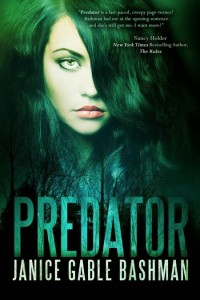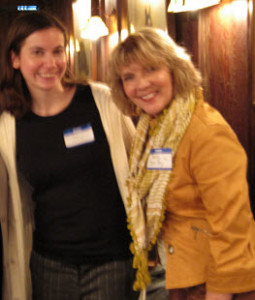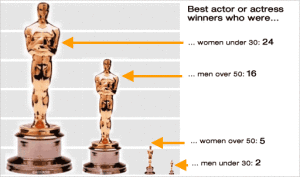I’m excited to have Janice Gable Bashman as my guest today at TKZ. Her latest release (now available) is PREDATOR with Month9Books. Stunning cover. Janice is a Bram Stoker nominated author and editor of the prestigious International Thriller Writers (ITW) publication, The Big Thrill, and she serves on ITW’s board of directors as the Vice President of Technology. Today Janice will share her tips on how to put a new spin to an old tale and make it fresh. Take it away, Janice—and welcome.
Janice Gable Bashman
I love when an author takes science to its extreme. Often it goes horribly wrong. I devoured early works by Michael Crichton (Jurassic Park and Sphere) and James Rollins (Deep Fathom and Amazonia) during my youth. The books were popular and it’s easy to see why. The authors took old tales—dinosaurs roaming the earth, a 300 year-old space ship at the bottom of the ocean, an ancient power causing havoc in a modern-day world, and a mysterious disease threatening to wipe out the population with the cure hidden deep inside the jungle—and put new spins on them. The stories were fresh and exciting and loved by many. They still are.
So how do you put a new spin on an old tale when readers think they already know how it’s supposed to go and there isn’t anything they can possibly learn?
You have to think outside the box, as the saying goes.
In my novel Predator, I give the werewolf legend a couple of new spins by introducing the Benandanti (an actual folkloric belief that certain families of Italy and Livonia were werewolves who fought against evil) as well as a modern scientific approach to mutation and the science of transgenics. But I take these new spins a step further. The science is used to its extreme, in some cases it goes horribly wrong, and the Benandnati may not be what they seem. How did the Benandanti end up alive today and living in Ireland and the United States? What are they up to and why? Are they good or evil?
By raising new questions, upping the stakes, and using science in a new way, I was able to put a new twist on the werewolf tale. Writing about science or werewolves or super soldiers is nothing new. They are simply a premise. It’s the story elements that give these topics a new twist and makes them fresh and exciting. And it’s the characters that bring them alive.
So how can you do the same with your premise?
Can you combine elements of different genres to create a new idea?
Can your protagonist see things from a perspective different than you ever thought possible?
Can you use your novel’s physical world to put a fresh spin on things?
Can you mash together two concepts to create something new?
Think about it. It’s possible. It’s up to you and your imagination to wow the reader with a new take on an old tale. I know you can do it.
So TKZers—what novels do you love that put a new spin on an old tale, and why?
———————————————————————————–
Janice Gable Bashman is the Bram Stoker nominated author of PREDATOR (Month9Books 2014) and WANTED UNDEAD OR ALIVE (w/NEW YORK TIMES bestseller Jonathan Maberry) (Citadel Press 2010). She is editor of THE BIG THRILL (International Thriller Writers’ magazine). Her short fiction has been published in various anthologies and magazines. She is a member of the Society of Children’s Book Writers and Illustrators, Mystery Writers of America, Horror Writers Association, and the International Thriller Writers, where she serves on the board of directors as Vice President, Technology.
Links:
Website: https://www.janicegablebashman.com
Facebook: https://www.facebook.com/JaniceGableBashmanAuthor
Twitter: http://twitter.com/janicebashman
Book buy links for Janice:
http://amzn.to/1xCYQwO
http://bit.ly/ZsJgFX (Barnes & Noble)
Category Archives: ITW
The benefits of traveling with a herd
Writing can be a lonely business. Social networking can help us break a sense of isolation, but only in a virtual way. One of the best ways for writers to connect is to become active in professional writer’s organizations. These groups, such as ITW (International Thriller Writers), MWA (Mystery Writers of America), and SiC (Sisters in Crime), have national and local chapter meetings and events that serve many useful purposes, including networking, advice, and support.
To get full benefit from the organizations, it’s important to become active, not just attend meetings. Several writers on this blog are active in national and local writer’s organizations. I’ve been a member of the board of the Southern California Chapter of MWA for the past year, and I recently became the Program Chair. Our first program of 2010 was “Tales from the Publishing Trenches.” It featured Kristen Weber, a former Senior Editor at Penguin Group (and my former editor), who regaled a packed house with stories and advice about the real world of NY editing. Kristen was interviewed by bestselling author Patricia Smiley (Kristen is pictured on the left, below. Patricia is on the right).
When you become actively involved with your writing organization, you contribute, make contacts and get your name out in the public. As a writer, I am capable of going long periods of time with little human contact except for my family and cats (who think they’re human). If nothing else, attending the meetings makes me drag my butt out of the house.
I’d be interested to hear about your experiences with professional writers’ organizations. How active have you been, and have you found the groups to be helpful or enjoyable?
ITW Thriller Awards
By Joe Moore
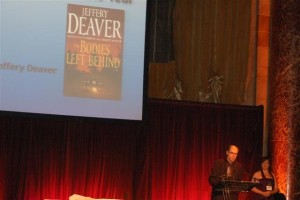 It’s Thriller Awards submission time again. ITW announced the winners of the 2009 awards in July during ThrillerFest. Jeffery Deaver won Best Thriller for THE BODIES LEFT BEHIND. Tom Rob Smith took home Best First Novel for CHILD 44. Alexandra Sokoloff grabbed the Best Short Story award for THE EDGE OF SEVENTEEN.
It’s Thriller Awards submission time again. ITW announced the winners of the 2009 awards in July during ThrillerFest. Jeffery Deaver won Best Thriller for THE BODIES LEFT BEHIND. Tom Rob Smith took home Best First Novel for CHILD 44. Alexandra Sokoloff grabbed the Best Short Story award for THE EDGE OF SEVENTEEN.
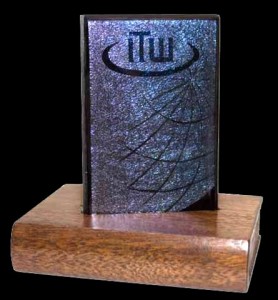 As previously discussed on this blog, the hard cover and paperback originals were lumped together into Best Thriller for 2009. For the most part, this was based upon the belief that a good book is a good book no matter what the format.
As previously discussed on this blog, the hard cover and paperback originals were lumped together into Best Thriller for 2009. For the most part, this was based upon the belief that a good book is a good book no matter what the format.
For 2010, things have reverted back to separating the hardbacks from the soft. So the categories are Best Hard Cover original, Best Paperback Original, Best First Novel, and Best Short Story.
ITW has announced the call for submissions. Competition is open to anyone who meets the requirements which include being published by one of the organization’s recognized publishers. You don’t have to be an ITW member to enter. A complete set of rules can be found on the Big Thrill website.
![Thrillerfest D3 '09 (Alan Jacobson) (194) [640x480] Thrillerfest D3 '09 (Alan Jacobson) (194) [640x480]](https://killzoneblog.com/wp-content/uploads/2009/08/ThrillerfestD309AlanJacobson194640x4-300x200.jpg) For a look at the 2009 Thriller Awards Banquet and ThrillerFest conference, visit the ITW photo gallery.
For a look at the 2009 Thriller Awards Banquet and ThrillerFest conference, visit the ITW photo gallery.
Now that the Thriller Awards are back to separating the hard cover from the soft, do you think there’s a preconceived prejudice between the two? In other words, if a book is published in hard cover, do you think readers consider it to be “better” that one released as a paperback? Or is it true that a good book is a good book?
Notes from Thrillerfest
WHY I DEDICATED “ILLEGAL” TO A TOTAL STRANGER
By Paul Levine 
Today TKZ is thrilled to welcome author Paul Levine, who has been nominated for the Edgar, Macavity, International Thriller Writers, and James Thurber awards. Today he discusses a subject near and dear to my heart, illegal immigration (although I confess to being green with envy over his earlier release date, considering the fact that my next opus treads similar ground). Read on for a true immigration story…
“Let me get this straight,” the Hollywood producer said. “You dedicated your book to an illegal alien.”
“A Mexican woman,” I said. “She floated up the New River on an inner tube with her little boy.”
“I didn’t know rivers ran north.”
An odd statement, I thought. Focusing on the flow of water rather than the flow of people. “Some rivers do,” I told him. “The Nile. The Monongahela. The New River between Mexicali and the Salton Sea.”
The producer licked his thumb and turned to the dedication page. We were sitting in his bungalow on the Warner lot. Outside the window, I had a fine view of the water tower.
He read aloud: “‘To the woman carrying a rucksack, clutching her child’s hand, and kicking up dust as she scrambled along a desert trail near Calexico, California.’”
He looked puzzled. That happens to people who don’t know rivers can run north. “I still don’t get it.”
“The boy and his mother. They’re the heart and soul of ‘Illegal.’”
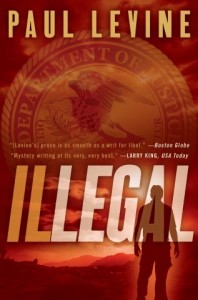 Then I told him the story behind the story.
Then I told him the story behind the story.
Three years ago, the news was filled with horror tales of border crossings gone bad. Families heading north were attacked by Mexican bandits or robbed by their own coyotes. People locked inside truck trailers literally baked to death. Women were beaten, kidnapped, and forced into sexual slavery. The hellish desert took its own toll, leaving the Border Patrol to rescue illegals as well as arrest them.
I wanted to write a novel set against the backdrop of illegal immigration and human trafficking, but what story would I tell? With me, the characters come first. When their lives are etched in my mind like petroglyphs on a cave wall, they tell me the story. I already had the protagonist. Jimmy (Royal) Payne, a down-and-out Los Angeles lawyer, would cross borders of his own while encountering immigrants, coyotes, corrupt cops, and human traffickers. But what was the spine of the story? I didn’t know.
On a day of blast furnace heat, I drove south through the desert, roadkill armadillos roasting on the pavement. To the east was the polluted Salton Sea. To the west, the Borrego Badlands. As I neared Calexico, the yellow “Caution” signs started popping up. Silhouettes of a father, mother, and daughter scampering across the road. The message: Be on the lookout for “pollos.” Cooked chickens in border slang. Coyotes are “polleros,” or chicken wranglers. Many of the signs were peppered were gunshots.
Bienvenidos a los Estados Unidos. Yes, welcome indeed.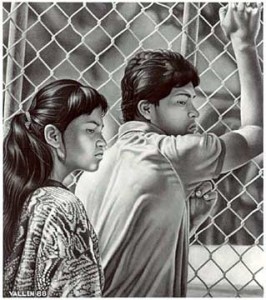
I thought of Freddy Fender singing Across the Borderline, an achingly sad tale about the “broken promised land.”
“And when it’s time to take your turn
Here’s one lesson that you must learn
You could lose more than you’ll ever hope to find.”
Near the border, I took a wrong turn onto a side road that dead-ended at the New River, a steaming current of raw sewage and toxic runoff that carries hepatitis, typhoid, polio, and cholera. Tree limbs bleached the color of skeletons floated in the water, which bubbled with a poisonous foam. Knowing of the Border Patrol’s reluctance to dive in, some hardy – or foolhardy – illegals swim with the current, white garbage bags over their heads to blend in with the noxious foam.
Getting out of the car, I saw no swimmers this day. But a large inner tube was grounded in the shallows. A striking, dark-haired woman in her early 30’s and a boy of 10 or so were picking their way across the rocks to shore. Backpacks, sneakers, and a gallon jug of water. Judging from the ease with which the woman hefted the jug, it was nearly empty.
I shouted out a friendly “Hola.” The mother froze. The boy stepped in front of her, a gesture of protection, the child on the verge of becoming a man. I ducked into my car, came out with a Thermos filled with iced tea. I held it up, a universal offer of friendship to travelers. They stood motionless. I walked toward them, but they started backing up…toward the river. I stopped short, placed the Thermos on the ground, dug into my wallet and placed several twenties under the Thermos. A puny gesture, given the enormity of their task.
 I returned to my air-conditioned car and headed for the main highway. Through my rear view mirror, I saw mother and son walking north along the dusty road. The boy carried the Thermos.
I returned to my air-conditioned car and headed for the main highway. Through my rear view mirror, I saw mother and son walking north along the dusty road. The boy carried the Thermos.
I didn’t know their names, so I gave them new ones. Marisol and Tino Perez. I imagined them wrenched apart in a border crossing gone-to-hell. They completed my trio of main characters. A shady lawyer. A missing woman. A lost boy. Their antagonist would be a wealthy California mega-farmer with a twisted vision of his own power.
“Illegal” is about choices. Will Jimmy Payne risk his life for two strangers or retreat into his own solitary world? The book is also about greed and corruption, revenge and redemption, all set in the dark world of human trafficking.
When I was finished, the producer said, “Why’d you help those illegals instead of calling the Border Patrol?”
“The Bible says, ‘Do not neglect to show hospitality to strangers, for by this, some have entertained angels.’”
“Don’t go biblical on me. Biblical doesn’t sell, except for Mel Gibson, and he’s so yesterday, he’s last year.”
The producer looked out the window where a motorized cart was hauling two-by-fours to a set under construction.
“This book got some blood and guts? Like ‘No Country for Old Men.’” 
“The hero gets horsewhipped.”
“That’s good. Like Marlon Brando in ‘One-Eyed Jacks.’”
“But it’s more like ‘Chinatown,’” I said, figuring movie analogies kept the producer in his comfort zone. “The abuse of power. Corruption of the flesh.”
He seemed to think it over a moment. “Can we lose that polluted river?”
“Why? Because it flows north?”
“Because no one will believe those illegals would risk it. Just why the hell would someone do that?”
“You nailed it,” I said. “The reason for the book. The reason for the dedication. It makes you ask, ‘Why the hell would someone do that?’”
You can read an excerpt of “Illegal,” sign up for Paul’s newsletter, and win cool prizes at http://www.paul-levine.com
Paul Levine’s new novel, ILLEGAL, has been praised as “the most original, offbeat and wholly entertaining novel of the year so far,” by the Providence (R.I.) Journal. Levine also wrote four novels featuring squabbling Miami trial lawyers Steve Solomon and Victoria Lord. SOLOMON vs. LORD was nominated for the Macavity Award and for the Thurber Prize for American Humor. THE DEEP BLUE ALIBI was nominated for an Edgar, and KILL ALL THE LAWYERS was a finalist for the International Thriller Writers Award. He was awarded the John D. MacDonald award for Florida fiction for his “Jake Lassiter” novels.A screenwriter, Paul wrote 21 episodes of the CBS military series “JAG” and co-created and co-executive produced “First Monday,” a drama set at the Supreme Court, starring James Garner and Joe Mantegna.
ITW Thriller Awards
Posted by Joe Moore
Recently, my fellow Kill Zone blogmates John Gilstrap and Michelle Gagnon posted blogs that addressed the announcement of the 2009 ITW Thriller Awards nominees and the judging procedure. Both blogs raised questions and concerns, and generated a large number of comments. To address those issues, I asked ITW Vice President of Awards Vicki Hinze to comment on how the current judging was conducted and what the future holds for the Thriller Awards process.
I’ve been out of town and just returned and saw the threads, so I thought I’d add a little insight, though I think the subject’s been pretty well covered. Still, a little more insight into this might put some minds at ease, and I’m all for that. Also, please note that I’m speaking for myself and not as a member of the ITW Board.
 Last year, I chaired the ITW Awards, and we did have separate categories for Best Hard Cover, Best Paperback Original and Best First Novel. All three awards named Finalists and Winners.
Last year, I chaired the ITW Awards, and we did have separate categories for Best Hard Cover, Best Paperback Original and Best First Novel. All three awards named Finalists and Winners.
In response to members’ comments, wishes and desires, we studied the market and discovered (no doubt many knew already, but we did study this) and determined that the format of a book is determined by readership and that varies publishing house to publishing house. In short, format is largely a marketing decision. The bottom line was that two categories, Best Novel and Best Paperback Original were combined for this year’s contest.
This year, when the scores came in, more analysis took place on the results. I’m serving as Awards VP, and I informed the Board that I would be asking that the awards again be separated. This will be on the agenda at the board meeting in July. If that vote goes as I hope it will, then the categories will be Best Hard Cover Novel, Best Paperback Original Novel, Best First Novel (which combines all debut novels–hard cover and paperback [mass and trade]). This year, we added an award for thriller Short Stories (which includes novellas) and next year we will continue it and we hope to add one for nonfiction.
One of ITW’s strengths, I believe–and it is this belief that got me to join and then to volunteer to judge and then to act as award’s chair and ultimately acted as a catalyst for me when it came to Board service–is that ITW remains open and flexible and seeks what is in the best interests of its members. That’s its top priority–and I say that as one who’s witnessed its workings and its methods of weighing potential programs and retaining or adjusting existing ones. (i.e. eliminating author membership dues)
ITW is a young organization and yet look at all it has accomplished for thriller writers. Has it been perfect since inception? No. No more so than any of us as individuals have been perfect. But ITW does strive to elevate potential for all involved, seeking win/win situations and solutions. I love that about the organization.
One reason, I think, for ITW’s success is its willingness to try different things and atypical approaches. Some have been enormously successful. Combining the categories for Best Novel and Best Paperback Original was not. I have no problem with saying an attempt made in good faith for logical reason on anything failed. Where I would have a problem would be in knowing it failed, in feeling confident it would continue to fail, and not doing anything to change it. That situation would be doing a disservice to members. Making changes that could benefit our members is a worthy goal.
So please understand that action is being taken on this matter. Can I say we won’t have future attempts that end up with results we find lacking? No, I can’t. I can tell you that we’ll continue to make every reasonable effort to create win/win situations for members. When a challenge is spotted, it’ll be addressed and hopefully resolved in a manner that best serves the majority of members.
Remember that we’re a progressive organization. We dare to try different things in different ways, seeking to do all we can to bring added benefits. Personally, I don’t see that as a flaw but as an asset. Change spurs growth; growth, productive change. It negates stagnation, and that’s a wonderful thing, in my opinion, because stagnant things die.
I do hope that this post eases minds. I’m not idealistic enough to believe that everyone will be satisfied with any program. But I do want you to know that we are trying to incorporate the desires and requests of members and to devise a program that satisfies the majority of members.
I don’t recall saying that the experiment of combining the two categories failed. But frankly, I am not satisfied with the outcome. It wasn’t good enough and I think we can do better. So that’s the goal. To do better.
This year, the structure of the program is behind us. Its benefits and drawbacks have been reviewed and we have a plan for a path with more benefits and fewer drawbacks to pursue–and we’re pursuing them. Please feel free to leave any comments on how to make the program better and stronger. I promise I’ll reply to all constructive suggestions.
Blessings,
Vicki Hinze
Vice President, Awards
International Thriller Writers
www.vickihinze.com
Vicki Hinze is the author of 21 novels. She holds a Master of Arts in Creative Writing and a Doctorate in Philosophy, Theocentric Business & Ethics. She actively lectures on writing craft and technique and philosophy.
Her articles have appeared many respected publications and e-zines (Novelists, Inc., Romantic Times, Romance Writers’ Report, The Outreacher, The Rock and others) and have been extensively reprinted in as many as sixty-three foreign markets. She has coordinated and/or judged national and international writing competitions, served on various writers’ association committees, has been honored by Romance Writers of America with their National Service Award and in 2004 was named PRO Mentor of the Year.
Vicki is a charter sponsor of International Thriller Writers and serves on its Board of Directors. She’s a member of The Authors Guild, American Christian Fiction Writers, Novelists Inc., Romance Writers of America, Mystery Writers of America, Published Authors Network, Emerald Coast Writers, ACRA, Deep South Christian Writers and other writing organizations.
PBO Prejudice
By John Gilstrap
http://www.johngilstrap.com
“The only bad news is that it will be published as a paperback original.” That’s what my agent told me when she called a year ago to reveal the otherwise wonderful news about my new contract with Pinnacle to launch the Jonathan Grave thriller series. (No Mercy arrives in bookstores on July 7.) My previous agent once told me that it is better not to be published at all than to be published as a paperback original.
The paperback stigma undeniably exists. Several people in my day-job office have complimented the stunning cover for No Mercy only then to offer condolences on the soft cover. “Maybe next time,” one of them said. This from people who religiously wait for the paperback reprints of their favorite authors’ novels to be released before they buy.
More evidence: At hardcover signings, fans occasionally ask sheepishly if I would be willing to sign my books in paperback. That they would think even to ask the question is troubling. That some authors in fact do refuse to sign paperback reprints is infuriating.
No Mercy is my sixth book, yet my first PBO. In the eyes of many, many hardcover authors who sell a fraction of the books I sell, this is clear evidence that my career is moving backward. I fight the urge to explain that it’s a strategic move that will make Jonathan Grave available not just in bookstores, but also in grocery stores and Wal-Marts and airports and corner bodegas because there’s no way to articulate the strategy without sounding defensive.
Here it is for the record and from the author’s mouth: I’m thrilled (albeit a little nervous) to be launching the Jonathan Grave series in mass market paperback. With a terrific cover (which it has) and terrific placement (B&N took a big position in the book), it makes sense to me that people will more readily lay down $6.99 to take a chance on a new character than they would $25.99. A good product that costs less should resonate at least as well as a good product that costs four times as much. Right? Granted, nothing in this business actually makes sense, but it sure seems reasonable to me.
Will the book be reviewed? Lord I hope so. (David J. Montgomery, listen up: Not only are there ARCs, but the ARCs are gorgeous!) It won’t be reviewed in the prestigious dailies of course because, well, they don’t review paperbacks. Publishers Weekly—THE trade magazine of the industry—may deign to review it, but only as one of a couple of mass market paperbacks. I don’t think they even did that until a few years ago.
That leaves me dependent upon online outlets, newsletters and word of mouth to get the word out about my book. There, too, I think the stigma thrives. A completely unscientific survey leads me to believe that even on amazon.com—the ultimate in populist literary criticism—PBOs get way less attention than their hardcover or reprint brethren.
Here’s the harm, then, in ITW’s decision to eliminate the PBO category from awards consideration: They deprived five books and their authors of their deserved high profile. It’s worse, in fact, than Michelle pointed out in her terrific post yesterday. Out of ten nominations between two categories (Best Novel and Best First Novel), not one was a mass market paperback original.
(By way of full disclosure, when I wrote a see-I-told-you-so email to the powers that be at ITW, I was told unofficially that the no-PBO experiment had been deemed a failure and that the decision would be reversed.)
Looking to the future, I think the debate should sidestep the question of whether PBO prejudice is real or even justifiable. It is real, and it doesn’t make a lot of sense. The operative question is what are we going to do about it? What is, needn’t be.
So how do we start changing things?
The Results are in…
The ITW recently posted the nominees for their Thriller Awards. Some of you might remember a post I wrote last August, when it was first announced that the paperback original category had been eliminated. Henceforth all of those books would be battling it out with the hardcovers for the moniker “Best Thriller.” There was a range of responses to my post, everything from “Hear, hear!” to “It’s silly to have different categories for different formats.” A few people chastised me, saying that any bias against paperbacks was only perceived, that I didn’t have enough faith in my fellow authors to judge a book based on its merits alone.
Well.
The results are in, and I am shocked, shocked! to report that not a single paperback original made the cut. 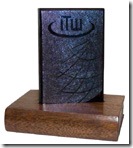
Here are the finalists:
BEST THRILLER OF THE YEAR
Hold Tight by Harlan Coben
The Bodies Left Behind by Jeffery Deaver
The Broken Window by Jeffery Deaver
The Dark Tide by Andrew Gross
The Last Patriot by Brad Thor
Now, I’m not claiming these aren’t the best thrillers of the year- of the five I’ve read three, and they were great. But I also read a slew of PBO thrillers last year, and I’d rank them as high (or higher) than those three. The ITW is always battling charges that it’s morphing into a club for NY Times bestselling authors, and judging by this list, that might be the case. Granted, books are subjective little beasties, and what I love others might loathe. Perhaps these were the best thrillers of the year. I plan on reading the other two to satisfy my curiosity (and because they’re probably good books).
But I still don’t see where having a separate category for Paperback Originals does any harm. If paperbacks are consistently passed over in favor of their hardcover brethren for another few years, I believe there will be an exodus of PBO authors from the ITW. Which would be a shame, considering the fact that this award was initially conceived to address the fact that few thrillers were acknowledged by the established mystery awards. And making PBOs the red headed stepchildren of the organization doesn’t help anyone.
That’s my two cents.
Comments?
As a writer, do your characters invade your “real life”?
That was my husband’s warning to me last week, after I survived a risky (and slightly smelly) stand-off with a mentally challenged dude on board a tram in Portland. For the roily details, see last week’s post,
Too close for comfort.I escaped from that little adventure with nary a scrape. In fact, I ended the episode with a thumbs-up sign and a jaunty little wave; but seriously, my part in the encounter was stupid. I could have gotten my ass seriously kicked by that guy, or worse.
All of which got me to thinking: To what extent (if any) does our writing affect our choices and actions in “real life”? Is there a bright red line that is never crossed between fantasy on the page and reality? Or do you find that there is ever any psychological “page-bleed,” as they say in the publishing world?
In my case, last week’s tram episode was completely out of character for the “real me,” Kathryn Lilley. Ever since I was an adolescent, I’ve always been a shy, retiring soul. I’ve traditionally avoided eye contact with strange men, much less interaction. In the past, I would never have tried to remove a mentally disturbed person on public transportation. (And let’s be honest—what I did was supremely stupid. I’ve been told by a number of Herman Munster-sized, macho-macho guys that the only reason I’m alive today is that I’m a woman, and that I stayed utterly calm throughout the encounter. Seriously, my heart rate didn’t even increase. I have no idea why.).
But ever since I started writing the Fat City Mysteries, I’ve found that I’ve been getting deeper and deeper into the emotions of my main character, Kate Gallagher. And now, I’m like one of those actors who stays “in character” between shooting scenes of a film. In many aspects of my life, I find myself coming up with quicker ripostes, more assertive actions—bottom line is, I’m acting more like Kate.
So my question is, is this experience a unique and unhealthy response to getting too deeply involved in the writing or characterization process? Have the rest of you experienced anything remotely similar?
But just as a reassurance to myself, I have made a solemn vow—no matter how much Kate Gallagher inhabits my thoughts and feelings, going forward, I will never, ever again attempt to toss someone off a tram.
“The envelope, please…”
Congrats to Ann Littlewood, commenter extraordinaire and winner of our $50 gas card prize! And now, on to today’s controversial subject…
There’s been an interesting debate recently regarding changes to next year’s Thriller Awards.
Basically, here’s the scoop: the ITW (International Thriller Writers) organization has eliminated the Paperback Original (PBO) category. Now everyone (aside from debut authors) will pit their books against each other for the Best Novel award.
I’m actually surprised there wasn’t more of an outcry. PBO is a treasured category, in that it gives writers who aren’t necessarily guaranteed a spot on the bestsellers’ lists an opportunity for some recognition.
Writers and reviewers weighed in on both sides. Some claimed this was a fantastic decision, that a “Best Novel” category where only hardcovers are eligible makes the “Best PBO” look like a red-headed stepchild. It should be the content that matters, not the format, the argument goes. Which is a valid point, and one I always wondered about: why isn’t it simply, “Best Hardcover,” since nearly every other awards category is defined by format?
And many who chimed in said they trusted their fellow writers to treat the binding on submissions with a blind eye.
But just to play devil’s advocate, here are some things to consider:
- Bias
Allison Brennan made an interesting analogy based on her previous work in the legislature. I’m paraphrasing, but basically she said that when you wanted to talk to voters about the economy, you used a man as your spokesman; if you were discussing education, a woman. Because even when people think they’re completely fair-minded, there are inevitably some biases lurking in our subconscious.
legislature. I’m paraphrasing, but basically she said that when you wanted to talk to voters about the economy, you used a man as your spokesman; if you were discussing education, a woman. Because even when people think they’re completely fair-minded, there are inevitably some biases lurking in our subconscious.
There’s a chance that authors might prove to be more, not less, biased when it comes to formatting. After all, we understand how the publishing industry works. Sure, we acknowledge that there’s an arbitrary element to what kind of cover ends up on a book, and some publishers tend to favor one format over another. But given a choice, most authors would probably opt for a hardcover deal. It’s easier to get reviews, and collectors value them more highly. Also, since the production costs are higher, there’s a chance the publisher might throw some marketing money behind the book. These are all things someone who’s spent some time in the publishing trenches knows.
The average layperson, on the other hand, has no idea what the different formats mean, they just know that certain books are more expensive. But while they wouldn’t necessarily assume that a hardcover is superior to a paperback, an author just might. Even if they don’t think they’re biased.
- History
I a sked during the discussion if anyone could remember the last time a paperback has been nominated for a Best First Edgar (since that category traditionally pits hardcovers against paperbacks, it’s a good reference point). I was curious, having submitted my debut thriller for consideration despite the fact that in recent memory I couldn’t recall a PBO garnering a nomination (if you know of one, drop me a line). Thanks to a bout of insomnia, I ended up going through the winners of Best First Novel Edgars (and believe me, I have discovered the cure for sleeplessness—this exercise could put Ambien out of business for good).
sked during the discussion if anyone could remember the last time a paperback has been nominated for a Best First Edgar (since that category traditionally pits hardcovers against paperbacks, it’s a good reference point). I was curious, having submitted my debut thriller for consideration despite the fact that in recent memory I couldn’t recall a PBO garnering a nomination (if you know of one, drop me a line). Thanks to a bout of insomnia, I ended up going through the winners of Best First Novel Edgars (and believe me, I have discovered the cure for sleeplessness—this exercise could put Ambien out of business for good).
I got all the way back to 1971 before finally drifting off. For at least the past 37 years, no paperback has ever won an Edgar for Best First Novel. Next time I can’t sleep I’ll trudge through every nominee in that category, but I suspect the story will be the same. We all want to believe our books are being judged on a level playing field. But if that’s the case, then is it really true that for the past thirty-seven years, a hardcover was always superior to every paperback submitted?
- Why awards matter
When I’m writing a book, the last thing on my mind is whether or not it’ll end up being nominated for an award. I doubt any author is envisioning that as they tap away at their keyboards (although I have been known on occasion to accept imaginary Grammy awards in the shower. But you should hear my singing voice in there, it’s pure Mariah Carey.)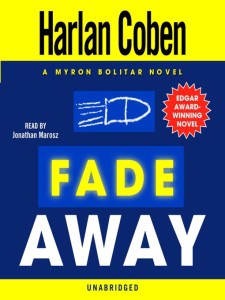
But we can’t pretend that awards don’t matter. Even my local bookstore (which has on occasion been downright hostile to genre fiction) mounts an Edgar display every spring. Harlan Coben has credited his 1997 Best PBO Edgar Award with keeping his career afloat, in that it persuaded his publisher to stick with him in the face of declining sales.
And again, I believe that a layperson couldn’t tell you the difference between an Edgar and a Barry if their life depended on it. But if they see, “____ Award Winning Novel” on the cover, they’re more likely to select that book over another one. Hey, it won an award, it must be a good read. So eliminating a category reduces the chance that five other books might garner some attention. IMHO, that is not a good thing.
- Apples and Oranges
There is inevitably some randomness to award distribution. Books on the whole are subjective little beasties, after all. And depending on the composition of the judging committee, some years noir may be favored over cozies, or vice versa. And really, how do you compare the two? Does the best romantic suspense novel trump the best paranormal? How do you weigh books written in only loosely related genres against each other? There are great books produced every year, across the board, in all formats. Yet it does seem that the more “serious” books (which tend to be hardcovers) have an edge. This is precisely why the Golden Globes feature separate categories for comedy and drama; it gives the comedies a shot, when traditionally they’re overlooked.
The RWA’s RITA Awards acknowledge this issue by having separate categories for Historical Romance, Paranormal Romance, and Romantic Suspense, among other subgenres. And these awards are generally acknowledged to be the romance publishing industry’s highest distinction.
- Multiple categories dilute the significance (or “Brand,” if you will) of the award
This claim I really don’t agree with. If anything, changing which books are eligible for an award on an annual basis would seem to threaten its legitimacy far more than keeping or adding categories (not to mention being incredibly confusing for authors and publishers). For example, last year my debut thriller was not eligible in the Best First category since it was a mass market paperback. The year before (2006) it would have been in the running, and it would again this year (2008). But in 2007 it was thrown into the mix with every other paperback author, regardless of whether they were on book one or twenty. Random? Absolutely. I’m glad they reverted to a true “Best First” category, with every debut eligible regardless of format. You only get one first novel, after all.
- “The Thrillies”
Personally, I’m all for having your more serious “Thriller Awards,” with gravitas, pomp, and circumstance. But after handing those out, why not have a little fun? Present an alternate set of awards and call them the “Thrillies.” Give a “Best Psycho” trophy (a knife, perhaps?) for the most terrifying villain, or a “Best Sex” prize for the best sex scene (I’ll let you use your imagination when picturing the prize for that one.) 
I realize that will probably never happen, but it’s fun to consider. I’ve always thought that the Thriller Awards should be to the Edgars what the Golden Globes are to the Oscars: more entertaining and light-hearted, with someone throwing up in the bathroom by the end of the show. The Golden Globes achieve that by passing out more awards, not less (and by serving copious amounts of liquor). And I don’t think an actor has ever turned one down because they felt having more categories diminished the significance.
I love the ITW organization, and have volunteered for it because I’m such a believer in their mission and goals. But in this instance I believe they’ve made a mistake.
There are many strong and legitimate opinions on both sides of this debate, and I’d love to hear them. Plus, if anyone has a spare Grammy hanging around, I’m in the market for one…

